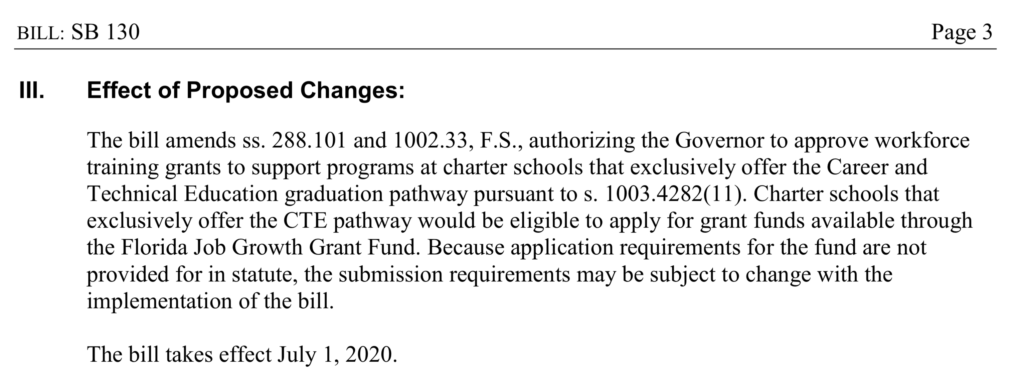SB130 Needs Amending
On Tuesday, 11/12/19, the Senate Education Committee will begin to hear bills. On the agenda is SB130, filed by Senator Travis Hutson (R-7), entitled “Florida Job Growth Grant Fund.” SB130 amends F.S. 288.101, authorizing the Governor to approve workforce training grants, under the Florida Job Growth Grant Fund, to charter schools that “exclusively offer the Career and Technical Education Graduation Pathway Option.”
The Career and Technical Education Graduation Pathway Option [f.s. 1003.4282(11)] is a new graduation option for the 2019-20 school year (established by 2019’s HB7071; Hutson sponsored that bill’s Senate companion, SB 770). It provides an alternate pathway to earning a standard high school diploma for students focusing on career and technical education (CTE). With the new pathway, students are required to earn 18 high school credits (including 4 Math, 4 Language Arts, 3 Science and 3 Social Studies credits) as well as credits in CTE, resulting in program completion and industry certification and “work-based learning programs.” With the passage of HB7071 last session, every Florida district school board was mandated to incorporate this new CTE graduation pathway into their student progression plan.
The Florida Job Growth Grant Fund is an economic development program designed to promote public infrastructure and workforce training across the state. Proposals are reviewed by Enterprise Florida, Inc. and the Department of Economic Opportunity and chosen by the Governor to “meet the demand for workforce or infrastructure needs in the community to which they are awarded.” In 2019-20, $40 million is available for these projects. Currently the “workforce training” grant recipients are limited to state colleges and state technical centers.
SB130 allows certain charter schools, those exclusively offering the 18 credit, Career and Technical Education Graduation Pathway Option, the chance to compete for $40 million Florida Job Growth Grant funds.
Hutson’s bill sailed through its first Senate committee stop, Commerce and Tourism. There, he described the bill like this (watch at 22:40):
“Last year we passed into law a new pathway for graduation focused on career and technical education. These schools require more hands-on technical learning environments that can be costly. This bill would allow any public or charter school that have exclusively the CTE pathway for graduation, to apply for grants out of the Job Growth Grant Fund. If any current technical schools expanded their programs to allow CTE graduation by adding core curriculums, they would also be able to apply. The goal is, since we just created this pathway to graduation, if we want new schools to open up that are career/technical based ONLY, so they are more career bound, not college bound, that’s an expensive program and we want to be able to find funds… I think taking funds out of our FEFP, which goes to our traditional schools, would be the wrong way to do it… I’m trying to find a new avenue for (to fund) this workforce training…”
The bill passed through the committee 5-0 after a few basic questions by Senator Torres. Who could oppose a bill allowing public or charter schools offering this new CTE pathway for graduation, to apply for grants out of the Job Growth Grant Fund?
The catch is, that is NOT what Senator Hutson’s bill allows.
SB130 specifically authorizes the Governor to approve grants to charter schools which exclusively offer the new CTE graduation pathway – NOT public schools in district’s which were just mandated to provide this new CTE graduation pathway (creating these programs is costly for those schools, too) – only charters exclusively offering this pathway.

The SB130 Staff Analysis also makes this clear:

I suppose we should say that we appreciate Senator Hutson’s efforts to avoid plundering the FEFP to pay for his charter school CTE programs. The rest of the bill is concerning.
Why did he present his bill as if traditional public school would see equal benefit? If that is his goal, then he needs to start writing amendments.
Hutson admits that creating CTE/hands-on learning environments is costly, but, after mandating that all school districts institute such an expensive pathway in their public schools, allows only certain charter schools to qualify for needed workforce training grants. Why are the grants only available to charter schools that exclusively offer the CTE graduation pathways? Is there a specific charter school vendor waiting to take advantage of such funds? Rural districts, where CTE/workforce training might be needed most, are logistically prevented from establishing stand alone CTE centers; their students need to have access to CTE within their neighborhood schools. Districts mandated to institute such pathways should have access to needed funding.
We hope the Senate Education Committee members will come to Tuesday’s meeting prepared to question the motives behind SB130. We hope Senator Hutson will have some answers. Why are public schools excluded? Why not fund CTE pathways within established schools? What charter school vendors are ready to capitalize on this workforce development funding?
The Senate Education Committee will be live-streamed on The Florida Channel, Tuesday, November 12 at 3:30 pm.
